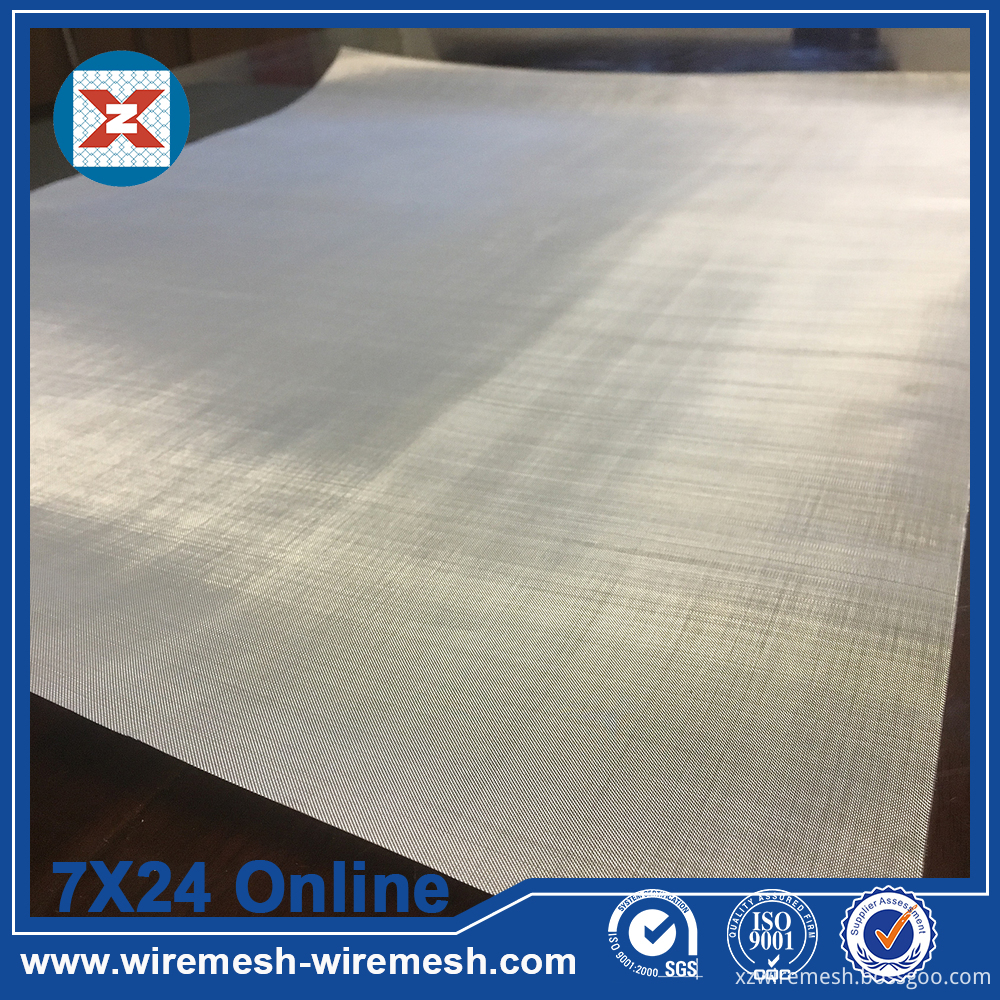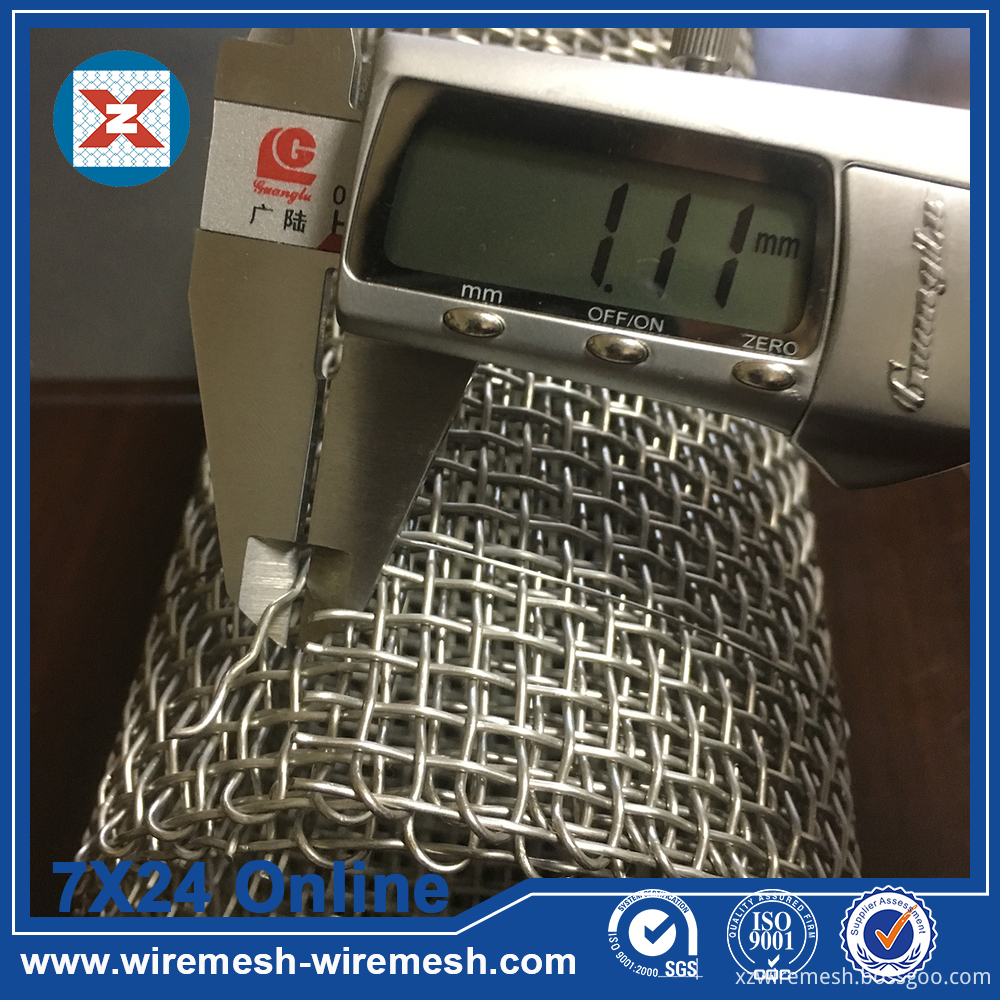Anping Xinzheng Metal Wire Mesh Co. Ltd produces and sells all kinds of specifications, models and materials of Woven Mesh Products. Our wire mesh products are highly praised by buyers all over the world.
Woven mesh is produced according to the mechanical engineering industry weaves JB/T5979-92 standard, the standard with international standard ISO4783/1990.
Wire mesh mainly adopts plain weave, twill weaving and Dutch weaving
The main material is stainless steel wire(SS 304, SS316, SS316L, SS 302), galvanized wire, black wire and so on
The main features of woven mesh are precise structure, uniform mesh, good corrosion resistance and durability.
Main applications of wire cloth: sifting and filtration in acid and alkali environment, oil industry as mud net, chemical fiber industry as sun filter screen, electroplating industry as pickling net, gas liquid filtration and other media separation.
Woven Mesh Products Woven Mesh Products,Metal Cloth,Woven Steel Mesh,Stainless Steel Mesh Anping Xinzheng Metal Wire Mesh Co., Ltd , http://www.sievingmesh.com
The catalogue of preferential tax policies for environmental protection equipment such as water conservation and comprehensive utilization of resources, prepared by the National Development and Reform Commission and the Ministry of Finance and other relevant departments, has attracted the attention of equipment manufacturers. It is reported that enterprises investing in energy-saving and environmental protection special equipment that enters the catalogue will be exempted from corporate income tax, and enterprises that invest in energy-saving equipment will enjoy preferential policies such as deduction of VAT input tax.
Xie Ji, deputy director of the Department of Environmental Protection of the National Development and Reform Commission, recently revealed that the catalogue that is still under development or will be introduced next year will have a great impact on the production enterprises and user enterprises of energy-saving equipment.
Shi Yaobin, director of the Ministry of Finance and Finance, said at the first high-level energy conservation and environmental protection forum held in 2007 that the country will increase the development and utilization of renewable energy, promote energy conservation, encourage resource conservation and comprehensive utilization, and strengthen environmental protection. The financial support will be adjusted and promoted through the development of new taxes. Equipment technology level is the key to industrial energy conservation
Liu Jiansheng, deputy director of the Policy Research Office of the State Council, has a clear-cut view: "Industrial energy conservation is the top priority of China's energy conservation and emission reduction work. Improving the technical level of equipment is the key to achieving industrial energy conservation and consumption reduction." According to reports, China's GDP per 10,000 in 2006 The energy consumption is 1.21 tons of standard coal, which is 7.5 times that of Japan, 5.5 times that of Germany, and 4.2 times that of the United States. In 2006, China's industrial added value accounted for 43.15% of GDP. The high proportion of industry in China's economic composition is an important factor leading to high energy consumption per unit of GDP in China. The fundamental way to change this situation is to strengthen the energy-saving potential within the industry while adjusting the structure of the economic industry. Liu Jiansheng believes that China's industrial equipment has great potential for energy conservation. Statistics show that the current industrial energy consumption accounts for 70% of China's energy consumption, and the low level of equipment technology is an important factor leading to high industrial energy consumption. From the perspective of industrial boiler equipment, the annual coal consumption of boilers in China is about 1.9 billion tons, accounting for 80% of coal production. In China's existing 540,000 boilers, most of the operating thermal efficiencies are only 68%, which is 15% to 20% lower than the average level of developed countries. If the thermal efficiency of the boiler is increased by 10%, China can save 60 million tons of coal per year. “Industrial equipment is not only an important tool for social activities, but also an important carrier of energy consumption.†Liu Jiansheng said that the state will formulate a series of measures conducive to energy saving of industrial equipment, on the one hand, speeding up the elimination of outdated production equipment, especially steel and colored Energy-consuming industry production equipment; on the one hand, it will increase energy-saving renovation efforts for most equipment that cannot be eliminated and backward, and improve its energy-saving level. He also suggested that relevant departments should formulate energy consumption indicators for industrial equipment as soon as possible, such as setting energy consumption indicators for boiler equipment and establishing an energy consumption access system for industrial equipment.
Xie Ji also pointed out that promoting technological progress is the key to achieving the goal of energy conservation and consumption reduction during the 11th Five-Year Plan. China should accelerate the research and development and promotion of energy-saving technologies, focusing on the development of environmentally-friendly technical equipment and basic equipment with independent intellectual property rights. Preferential taxation trend energy-saving equipment
Ye Ruzhen, deputy director of the National People's Congress Environmental Protection Committee, said that at present, China's energy conservation taxation and price policy system is not complete enough, and an energy-saving fiscal and taxation price policy system and specific measures should be formed as soon as possible to provide tax incentives for energy-saving investment. At the same time, we should pay attention to the establishment of a long-term mechanism for energy conservation and emission reduction
Regarding the orientation of preferential tax administration, Shi Yaobin said that the improvement of China's tax policy will adhere to the four principles, that is, the combination of market leading and tax policy promotion, the combination of standardized tax system and appropriate inclination, the combination of incentive mechanism and constraint, and overall planning and Step-by-step implementation. Relevant departments will establish reward and punishment policies in accordance with the above principles. On the one hand, they will support resource conservation and energy conservation and reduce environmental pollution through preferential tax policies. On the other hand, they will impose punitive tax policies on enterprises with high energy consumption, high pollution and low resource utilization.
In addition to compiling the catalogue of relevant energy-saving equipment to enjoy preferential tax administration, Xie Ji also suggested that the state should set up special funds to encourage the procurement of energy-saving equipment and further improve the government procurement system for energy-saving products. At the same time, we will enlarge and strengthen high-tech industries, strengthen energy structure adjustment, vigorously develop renewable energy, and improve relevant fiscal and taxation policies as soon as possible.

